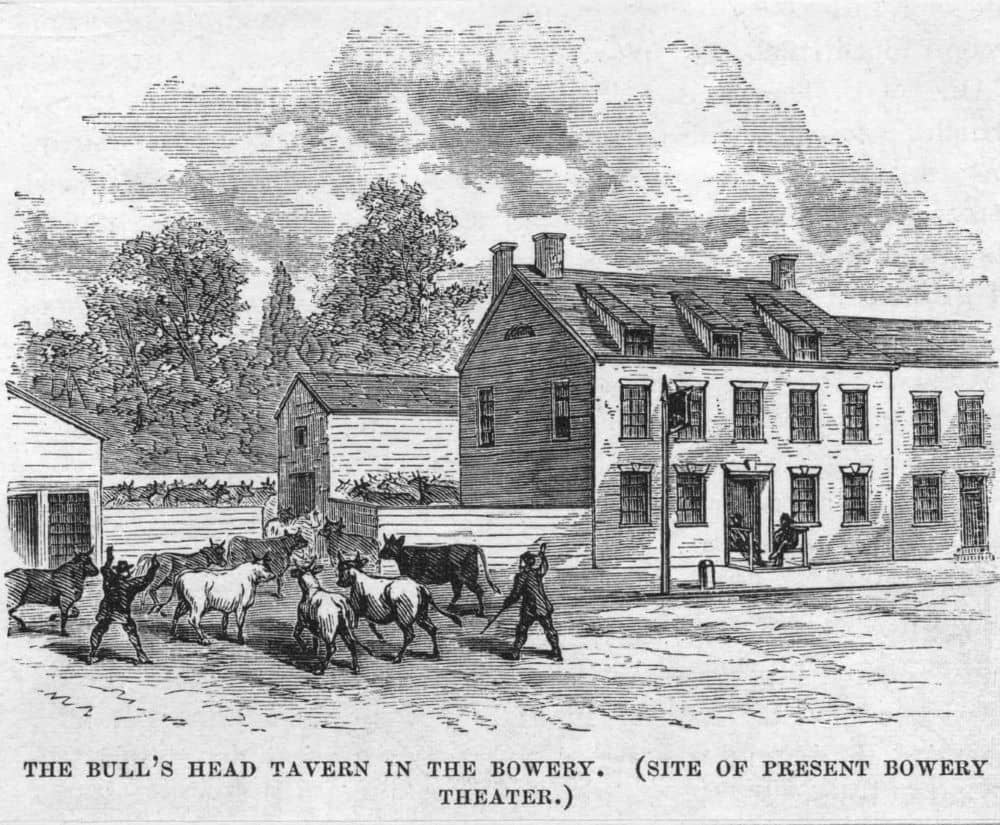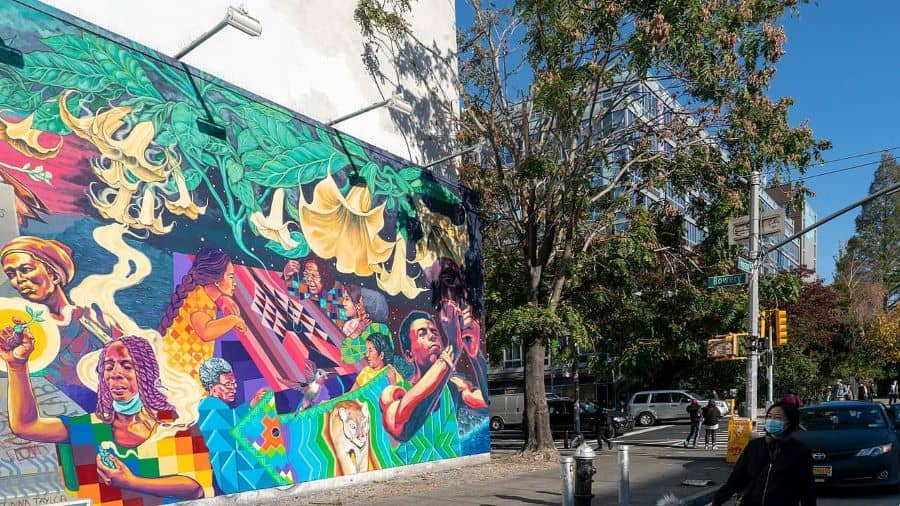Between NoHo and the East Village lies the oldest street in New York City. The Bowery isn’t just a street though. It’s also a tiny neighborhood that has carved out an identity in the city since it was first used pre-colonization. This old street has a story to tell. Sometimes it’s sordid, other times it’s artistic, but no matter what, it’s always unique. The history of this street is also the history of NYC. They are forever intertwined with one another, and will continue to be for the rest of this city’s great history. So let’s take a look at The Bowery and its impact on NYC.
What is The Bowery
Before Europeans even thought to set foot in this land, The Bowery was already an important part of the civilizations that existed here. The Lenape nation used The Bowery as a footpath that spanned the entire island. This path ran north to south and served as the island’s main nerve when trading with other nations. It also served as a cultural marker for the Lenape, which led to meeting and storytelling locations in the south, and places ideal for farming to the north. The path was so prevalent that, when the Dutch arrived to the Island in the late 1600’s, they saw the path as an opportunity to establish a colony.
Original Bowery History
After the Dutch forced the Lenape out of lower Manhattan, they established a military fort as well as a few farms or “bouwerie” which is where the street got its name. Many people grabbed land around the Bowery including the first freed enslaved people in the New World. The street was so popular with farmers and the growing community that the last Governor of New Amsterdam, Peter Stuyvesant, retired there after transferring the island over to the British in 1664. The British saw the potential of the road and renamed it “Bowery,” a more anglicanized spelling of the Dutch word.
Once the British turned “The Bouwerie” into “The Bowery” and “New Amsterdam” into “New York,” the Bowery became a popular destination for the people of NYC, even if they were just visiting. The road would mostly remain peaceful farmland until 1766. The city then created plans to expand the area. They selected The Bowery for a small shopping hub, mostly for food grown from the farms. Developers also constructed several taverns in the area. However, things got a bit hectic when the Revolutionary War started.

One tavern on Bowery, The Bulls Head, was a popular spot for farmers and merchants, but became a recruitment center for British Loyalists after George Washington was forced to retreat from the city. However, when Washington returned to drive the British out, he used The Bulls Head to watch their retreat and made it his temporary headquarters for a brief period of time. After the war, the street and its taverns became very popular with high-ranking government officials, who would often go there to have meetings and drink.
Post-Revolution
By the 1800’s, New York City had expanded pretty far north, and almost all the farmland had become shops, taverns, and theaters. In fact, The Bowery was the original home of the Theater District in New York City, housing large auditoriums like the Bowery Theatre, which was the largest theater in North America when it was built in 1826, though it likely didn’t have a lot of competition. The Bowery Amphitheater was opened in 1833 and held equestrian displays and circuses.
The Bowery was the place to go if you were a rich New Yorker seeking entertainment. However, other streets, like Broadway and Fifth Avenue, began to rival the Bowery in entertainment prowess. As the city expanded northward, so did these major streets and entertainment options. Soon, shops, homes, and theaters were sold, and were replaced with brothels, flophouses, pawn shops, and cheap concert halls.
Civil Unrest
By The Civil War, the Bowery had lost most of its glamorous reputation, while simultaneously garnering a more dangerous one. The Bowery was the eastern border of Five Points, a slum that saw fierce gang fighting in the 1800’s, including from The Bowery Boys, a gang named for the street they operated on. It remained this way through the Civil War and the reformation era despite attempts to reform and revitalize the area. The first ever YMCA was built in the Bowery in 1873, but not even they could bolster the area’s reputation as a crime den.
Progressive History Aligns with NYC
To be fair, it wasn’t all bad. The Bowery had some of the first bars to cater to the LGBTQ+ community in New York. The tough reputation of the neighborhood, in the late 1800’s, largely ensured that these bars would be left alone. These places allowed the community to safely gather and be themselves. Tourists would even frequent these establishments to see how the other side lived. And they saw that the other side was having a pretty good time!
Even with that progressive mindset, the Bowery still wasn’t a place you wanted to get lost. It was dark and dreary, largely thanks to the Third Avenue El, the elevated train tracks that ran above the street. This reputation would continue to haunt the neighborhood into the 1900’s. The area only got poorer during prohibition, which closed down many of the taverns in the area, and The Great Depression, which put a financial burden on NYC as a whole. Minor changes were pitched as revitalization efforts. For example, city officials tried to change the name of the street on three separate occasions. However, what the street really needed was a massive overhaul.
Post-War Modifications
For those who live in the city and don’t see the Bowery as a seedy hot bed of crime, they may be wondering how it went from “NYC’s Skid Row” to a place that’s actually pretty cool. The first major step forward was getting rid of the Third Avenue El in 1955. This allowed the sun to shine on the streets, and actually made people want to frequent the area more. The rest of the work began in the 1970’s, when the city started revitalization efforts, in earnest, for the entire lower east side of Manhattan. However, many criticized some of the efforts.
In the 1970’s, the city hit back against crime, hard, dismantling most of the illegal activities the street became known for by the 1990’s. Once the crime element was all but gone, a massive wave of gentrification swept the area. People began flocking to The Bowery in droves, and luxury buildings began construction in the early 2000’s. These newer buildings destabilized the area, displacing dozens of people and closing one of the last flop houses in the country, a story that was detailed in the 2001 documentary Sunshine Hotel.
Bowery New York Today

Today, The Bowery is back to being a grand place for the rich people of New York. It’s not currently a thriving entertainment district, but there are some options for those seeking excitement. The Sperone Westwater Art Gallery, for example, is a major draw that was built in 1975 and helped bring life back to the street. Other venues draw crowds as well like The New Museum and The Bowery Ballroom.
A number of restaurants and bars have opened in the area too, making it a pretty popular culinary and nightlife destination. Particularly popular places include Baar Baar, which is possibly the best Indian restaurant in the city, and Attaboy, a cocktail bar with a great vibe and aesthetic. While these places are great, they are still a bit spread out. The biggest industry to survive the Bowery’s days as a slum are kitchen and restaurant supply stores. However, as time marches on, it seems like this area is trending more towards a NoHo aesthetic rather than an industrial one.
Turning With Time
As we look back at The Bowery’s history, many people call it a slum, a skid row, or a place where degenerates gather. As the city transformed and rich people left the Bowery to go north, the poor people of New York needed to go somewhere. Many residents turned to crime after the city left them behind. They felt abandoned by their city, and had to create a place that accepted them, for better or worse. The Bowery wasn’t a bad place because bad people flocked there. The city abandoned it, creating an undesirable environment.
Conclusion
The Bowery can teach us many important lessons about NYC’s past, present, and future. From thriving theaters, to seedy slums, to today, the Bowery is a walking example of a city’s decisions. The history of the Bowery is the history of NYC because the street has literally seen it all. It’s easily one of the most important nerves of the city, and it will likely remain that way for the rest of its existence.




